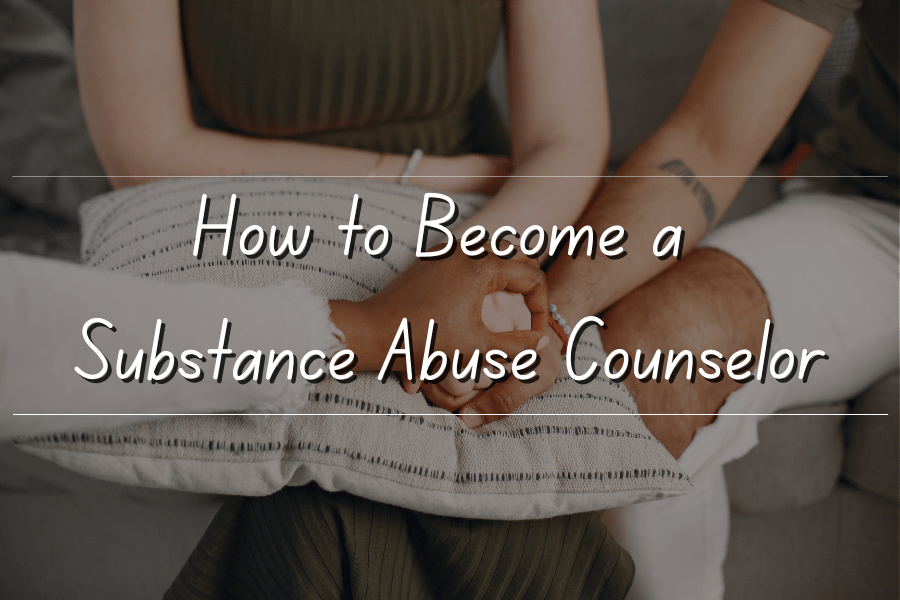
There is a critical need for counselors in drug and alcohol abuse counseling in cities and towns across the United States. It’s difficult to ignore the daily stories and headlines about people and families who have been ravaged by addiction. This is especially true with the current crisis in opioid abuse.
There are many reasons people choose to become substance abuse counselors. Some do so after overcoming their addiction. Others find the job appealing after helping family members or friends with recovery. A deep desire to help others is often the reason for career interest.
No matter what the motivation, all those in this field share the same goal: To help people reduce or eliminate their dependence on alcohol and drug use and improve their quality of life.

What is a Substance Abuse Counselor (SAC)?
A counselor for alcohol and drug abuse is someone who has the experience to provide treatment to clients who are looking to decrease or eliminate their dependence on harmful substances.
Counselors can work with individuals, families, and couples to offer a range of methods and treatments to help people cope with their problems without resorting to harmful substances.
There are many reasons people abuse alcohol and drugs. Many times it is to cope with stress or other problems in their lives. To abuse a substance, a person does not have to be dependent on it. Substance abuse can be compared to addiction because it is a way for someone to experience mind-altering effects.
Abusing can lead to a reduction in time spent at work, school, or socializing. Stress in these areas can trigger addictive behavior. A person suffering from substance abuse should be treated and given a plan of recovery. However, this is usually less than if they are experiencing full-blown addiction.
What does a Substance Abuse Counselor do?
The job description of a substance abuse counselor will vary depending on where they work, but counselors generally provide support and treatment to help people overcome addictions or modify problematic behaviors like eating disorders.
Counselors for substance abuse help clients to identify the reasons they are turning to drugs or alcohol and then work with them to develop techniques and treatment to turn their lives around.
Counselors can help clients assigned by the court. Family members or friends may call on counselors to assist with intervention. Counselors may specialize in certain demographics, such as veterans or teens, or people with disabilities. People of all ages, races, incomes, education levels, and genders are affected by alcohol and drug abuse.
There is always a need, no matter which career path you choose in the field of drug and alcohol abuse counseling.
Counseling can be described in many different job titles such as addictions counselor (CADC), case manager (CD counselor), chemical dependency counselors (CD counselor), counselor, clinical counselors, correctional substance abuse counselors, counselors, drug and/or alcohol program advisors, and drug and/or alcohol treatment specialist (DATS), to name a few.
Counselors must have excellent communication skills and teamwork skills. They work with registered nurses, psychologists, and psychiatrists to create treatment plans and coordinate care for clients.
Are You a Substance Abuse Counselor? Needs of Substance Abuse Counselors
Substance abuse counseling can be a challenging and specialized job that has its certification. This field is a great entry point to counseling careers. You don’t have to be a bachelor’s or master’s degree to become a counselor for drug and alcohol abuse in 48 states. However, it requires specialized training.
Counseling is not a career that people pursue just to make a living. It’s a good idea to become curious about the education and experience required to be a counselor in alcohol and drug abuse. This is because it will take you a while to read journal articles and books on this subject if you want to pursue this career. You also have the following qualities that make a great counselor:
- Active listening is the ability to listen and understand what clients are saying about their lives.
- Empathy – Being able to view your client’s experiences through their eyes; you can put yourself in their shoes
- Companion – Showing genuine concern for the client
- Patience – Understanding that each client’s progress towards positive change will take place at their own pace
- Open-mindedness: Being open-minded about the details that clients share with us
- Sensitivity – keeping client’s stories and their health information confidential
- Authenticity is being honest, sincere, and forthright when dealing with clients
Positive outlook for Substance Abuse Counselor Jobs
One of the fastest-growing occupations in America is substance abuse counseling. According to the Bureau of Labor Statistics, there will be a 23% rise in employment from 2016-2026. This is due to an increase in addiction counseling services and states that seek counseling services rather than jail time for drug offenders.
National University’s undergraduate certificate program in alcohol and drug abuse counseling has Dr. Donald Posson as its instructor. He’s been working in addictions and mental healthcare for more than twenty years. His job projections are not surprising.
He says, “That doesn’t even take into account the opioid crisis’s need.” “We haven’t even started to address the counseling aspect of it, or identified how to handle it or provide resources for it. It will require many more therapists in the future than what we have now.
Dr. Posson points out that only 10% of California’s therapists have had experience with substance abuse counseling. It is difficult for individuals seeking therapy and counseling to find qualified professionals who can help them overcome their negative habits.
National University was able to step in. Dr. Posson says, “Because there was a need in this specialty, we designed the program to help professionals who need to earn enough education credits to become certified in substance abuse treatment.”
There are many career opportunities for a counselor in drug and alcohol abuse
You can find many types of jobs in this industry. It is important to know the facts about addiction before you consider a career in your community.
This field offers counseling jobs in outpatient programs as well as in prisons, shelters for the homeless, halfway houses, and juvenile facilities. Many positions require full-time work and may involve working nights and weekends.
Salary ranges for substance abuse counselors are dependent on a variety of factors including education level, field experience, and job setting. While non-profits tend to pay lower salaries, compensation at high-quality residential facilities may be more.
According to the Bureau of Labor Statistics in 2017, the median wage for substance abuse counselors was $43,300. The lowest 10% earned less than $27310, while the highest 10% earned more than $70,840. Dr. Posson found that many drug and alcohol abuse counselors have a passion for helping others, rather than just pursuing a paycheck. He says that people are not looking for a job, but are drawn to the field.
How to become a Substance Abuse Counselor
It is easy to become a substance abuse counselor. You will need to have supervised, on-the-job experience and education to be certified. Graduate-level education is required and you will need to have extensive work experience to become a licensed counselor.
National University offers an undergraduate certificate for alcohol and drug abuse counseling. Online courses allow anyone to take the course and set a schedule that suits their needs. Students can register at any time and start the course whenever they want, regardless of their location.
You can complete the academic requirements in 8 months. The practicum takes six months and you will work with clients at a site approved.
This program is for students at the beginning of their academic careers, as well as advanced degree holders who want to specialize in addiction counseling and are looking to obtain certification in alcohol and drug abuse counseling.
Dr. Posson explains, “The cool part about our program is we have students very young in their education in a class with bachelor-level and master-level students that have more experience in counseling.” It’s a great way to interact and dialogue.”
California certification standards are met for the undergraduate certificate in alcohol abuse counseling program. Students who live or work elsewhere should check their state’s requirements.

Certification requirements for Substance Abuse Counselors
To be eligible for employment in this field, most states require 415 hours of substance abuse counseling. Every state has its requirements. It is important to determine how many hours you will need depending on where you work. Most states require you to pass an exam in addition to academics and work experience.
Some states require that you have completed 2,000-6,000 hours of internship before you can take the exam. However, requirements will vary depending on where you are at an academic level. You are an intern in alcohol and drug counseling under supervision and pay a salary. Each state has its requirements.
The undergraduate certificate in alcohol abuse counseling at National University prepares you to work in entry-level positions and can be used as a stepping stone for pursuing advanced psychology degrees or a career in the mental health field.
The Undergraduate Certificate in Alcohol and Drug Abuse Counseling
National University’s undergraduate certificate program is largely online. This includes live-streaming classes. The practicum is the final class of the program. Students are given the assignment to work with clients in the community and participate in a seminar that reviews their fieldwork.
Students begin their certificate program almost immediately. On-site preparation begins almost immediately. Dr. Posson says that the program helps students to build relationships with local addiction communities by giving them assignments. “By the end of their last class, they already have relationships and a plan for where they want to do their practicum.
We then assist them in obtaining a signed agreement for six months with the agency, totaling 255 hours. This is the minimum required in all states.
National University offers an undergraduate certificate that combines psychology, physiology, and law with counseling and case management. Students are taught how to diagnose and create unique treatment plans for each client. The program includes the ability to build relationships with counselors and professionals. Students are encouraged to go out into the field to get advice from those who work in the field.
The classes are diverse and designed to help students apply the skills they have learned. For example, in Introduction to Substance Abuse, students will need to visit their local communities to interview at least two to three counselors for drug and alcohol abuse to learn more about why they chose this field. Students in Group & Family Counseling are required to sit in on counseling classes held at agencies to assess the group process.
Students are required to attend several 12-step meetings to process and evaluate the effectiveness of the 12-step program in helping recovering addicts. Students reach the final class of the program, Practicum In Substance Abuse. They are now working on-site as counselors.
Dr. Posson emphasizes that the National educational model has a significant additional benefit. He says that most students have established a relationship with their agency directors and therapists by the time they reach the practicum classes. The majority also receive offers from these agencies once they have completed their practicum. They then continue to post-grad supervision, which will lead to certification.
Online enrollment is possible at the National University program. Class sizes remain small, with under 20 students. Students can join the program at any moment and take as much time as they need. Classes start monthly. Students don’t have to take classes in a specific order. They can begin in the middle of the course and return to previous courses as their schedule allows.

Learn from your Experience
Dr. Posson participated in the development of the undergraduate certificate program. He knows well the devastating effects that alcohol and drug abuse can have on military families. “I am a retired Navy. He recalls that he completed his master’s degree in the latter part of his Navy career. This allowed him to be selected to become a program director for substance abuse counseling in Italy.
Dr. Posson started looking at licensure and certification pathways. He realized that there was no way to continue his active duty while he took the academic courses. He was hired by National University years later and allowed to create a flexible, accessible educational path to become a counselor.
Dr. Posson says, “It is always at the back of my mind that we can support our military counselors.” I know that many people in the role of advisors to drug and alcohol programs have the desire to pursue an academic path while serving active duty. This program allows them to do so. My heart goes out to active-duty sailors, veterans, and their spouses. They experience a very different lifestyle which can be stressful and lead to substance abuse.
Career Longevity
It would appear that counselors are subject to high levels of burnout due to the nature and demands of their work. Although the work can be physically and emotionally taxing, counselors often find that their passion for helping others outweighs any potential negatives. Many counselors move on to other counseling types as they gain more experience and education.
Dr. Posson says, “I believe people evolve into other types of counseling and that most people in this field tend to stick around.” “For example, I see only 20% of my private practice in substance abuse counseling. This is because my postdoctoral research led me to neurofeedback, which has a wider application.
I have treated patients as young and old as 28 months of age, as well as those as old as 90 years. I have worked with every type of disorder that you can think of, but my journey began with substance abuse counseling.
For more information on courses and requirements, visit the National University’s undergraduate certificate program in alcohol and drug abuse counseling page.